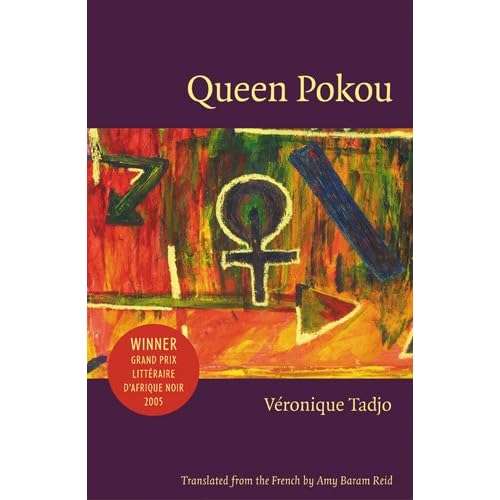
I just read a beautiful translation of Véronique Tadjo’s Queen Pokou by a prof here at New College, Amy Baram Reid. Amy was my professor fifteen years ago; one of my favorite classes in college was her course called New Worlds, New Stories: Women Writing in the Americas. As a matter of fact, I discovered one of my all-time favorite books, Michelle Cliff’s Free Enterprise, in that course, as well as developing a new appreciation for and understanding of gender politics through literature.
In Queen Pokou, Véronique Tadjo re-imagines the 18th-century Western African legend of Queen Pokou, who according to said legend, threw her baby into a river in order to appease the gods and save her exiled people. The river parted, Pokou’s followers crossed, and the Baole people were born out of Pokou’s cries: “Ba-ou-li. Ba-ou-li (The child is dead).”
This book exists as a series of concentric maybes. It’s beautiful in its rendering of the grief of a mother to, alternately, the fear-inducing power of a queen coming into her own. One iteration of Tadjo’s re-imagining, “The Atlantic Passage” asks, “But what if Abraha Pokou had refused the sacrifice?” and takes Pokou and her son to the Americas via the slave trade.
Being a big fan of retellings in their ability to redistribute power and deconstruct prohibitive worlds, I like what Amy Baram Reid says in the book’s afterword:
By contesting established readings of Abraha Pokou’s story, Tadjo does more than re-appropriate this one specific foundational story. In the very powerful conclusion of “The Words of the Poet,” she insists upon the value of open-ended stories–myths, legends, oral traditions, testimonies and fictions–that bring us face-to-face with our flawed humanity.
In this light, Queen Pokou needs to be read as a personal account of Tadjo’s efforts to find a way back across the border to the Côte d’Ivoire where she was raised and as a road map she offers to guide her readers toward the wisdom embedded in the oral tales and the foundational stories we know well and too often fail to interrogate. My hope is that this translation will make it possible for more readers to follow the paths Tadjo traces, to re-examine the borders of our humanity and the stories–both personal and shared–that shape our understandings of self and other.
The book reads like interlocking legends–sweeping and wide-reaching; panoramic versus minute. I think that’s the case with passed-down histories. They’re about the broad stroke and the big picture; but Tadjo brings to these stories an inner life, an inner grief, that speaks for a queen relegated by language to one heroic act.
Tags: amy baram reid, queen pokou, veronique tadjo

vipstores.net
vipshopper.us
What in the hell is going on here?
What in the hell is going on here?
vipstores.net
vipstores.net
I LOL’d pretty hard at this
It would be ultima cool if someone could spam the vip site with HTMLG links – even more ultima: boomerang HTMLG links into the computers of the spambotic humans.
vipstores.net
madeshopping.net/